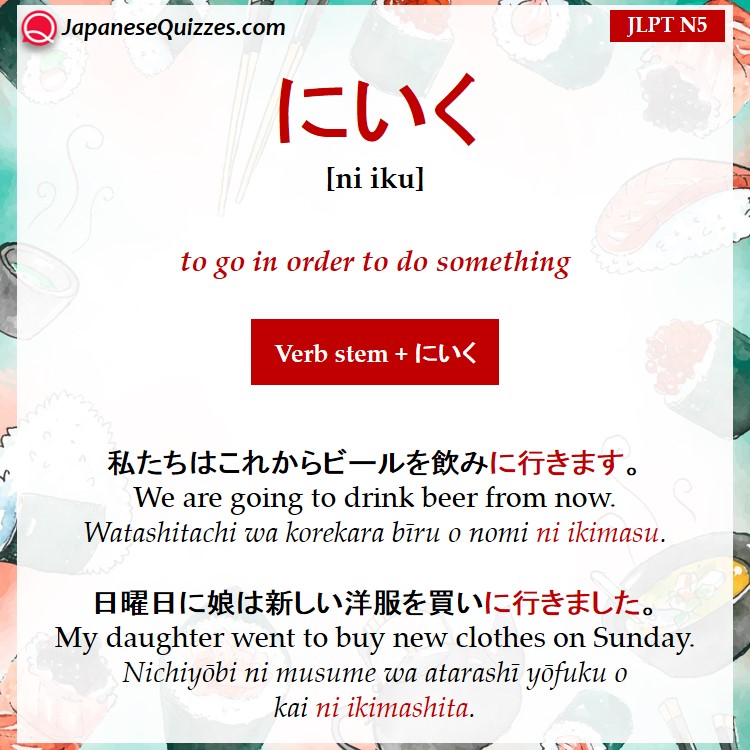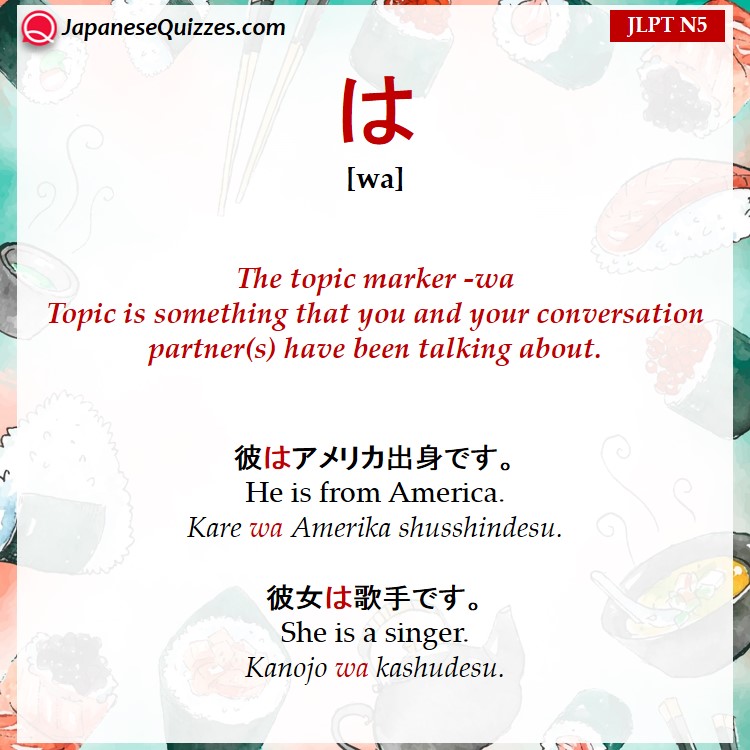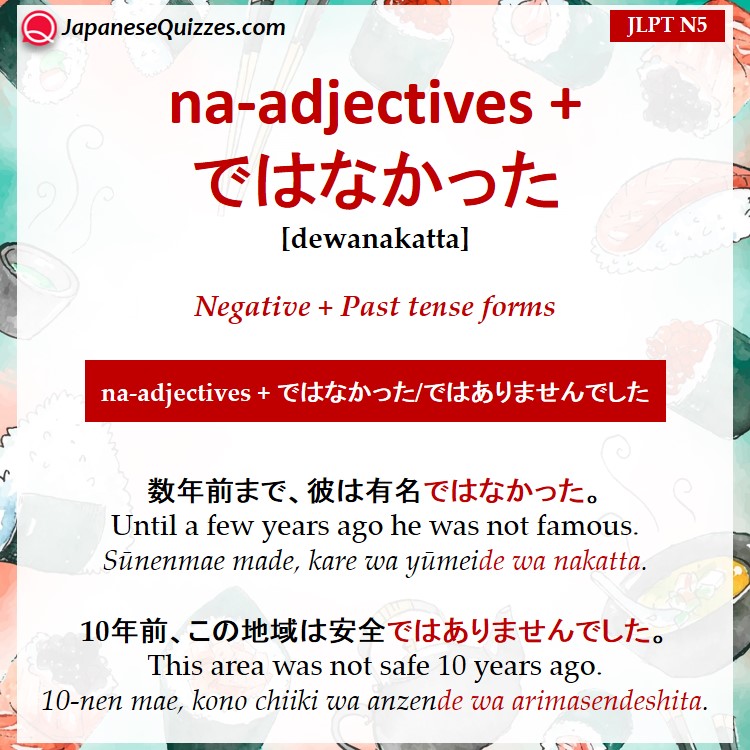

Formations
Verb-dictionary form + のがじょうず
Examples
あなたのお姉さんはピアノを弾くのが上手です。
Anata nōnēsan wa pianowohiku no ga jōzudesu.
Your sister is good at playing the piano.
ジョンは料理をするのが上手です。
Jon wa ryōri o suru no ga jōzudesu.
John is good at cooking.
弟はプログラミングをするのが上手です。
Otōto wa puroguramingu o suru no ga jōzudesu.
My younger brother is good at programming.
彼女は日本語を話すのが上手です。
Kanojo wa nihongo o hanasu no ga jōzudesu.
She is good at speaking Japanese.
私の息子は絵を描くのが上手です。
Watashi no musuko wa e o kaku no ga jōzudesu.
My son is good at drawing pictures.
私の妻は歌うのが上手です。
Watashi no tsuma wa utau no ga jōzudesu.
My wife is good at singing.
See also
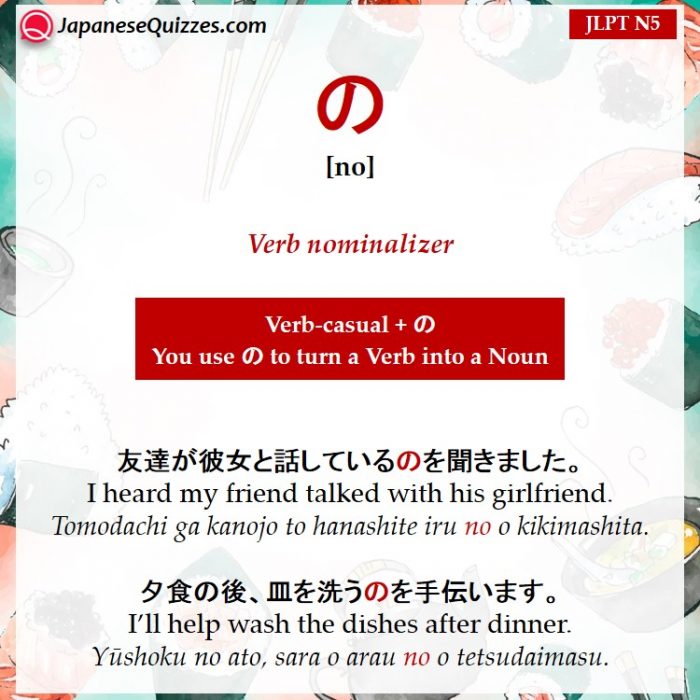

Formations
Verb-casual + の
You use の to turn a Verb into a Noun.
Examples
友達が彼女と話しているのを聞きました。
Tomodachi ga kanojo to hanashite iru no o kikimashita.
I heard my friend talked with his girlfriend.
友達と遊ぶのは楽しい。
Tomodachi to asobu no wa tanoshī.
Hanging out with friends is enjoyable.
弟が家に帰るのを母は待っている。
Otōto ga ie ni kaeru no o haha wa matte iru.
My mother is waiting for my brother to come home.
昨日、私はお昼ご飯を食べるのを忘れた。
Kinō, watashi wa ohiru gohan o taberu no o wasureta.
I forgot to eat lunch yesterday.
一昨日、試験を受けるのを忘れた。
Ototoi, shiken o ukeru no o wasureta.
The day before yesterday I forgot to take an exam.
夕食の後、皿を洗うのを手伝います。
Yūshoku no ato, sara o arau no o tetsudaimasu.
I’ll help wash the dishes after dinner.
来週の月曜日、あなたが日本語を勉強するのを手伝う。
Raishū no getsuyōbi, anata ga nihongo o benkyō suru no o tetsudau.
I will help you learn Japanese next Monday.
See also
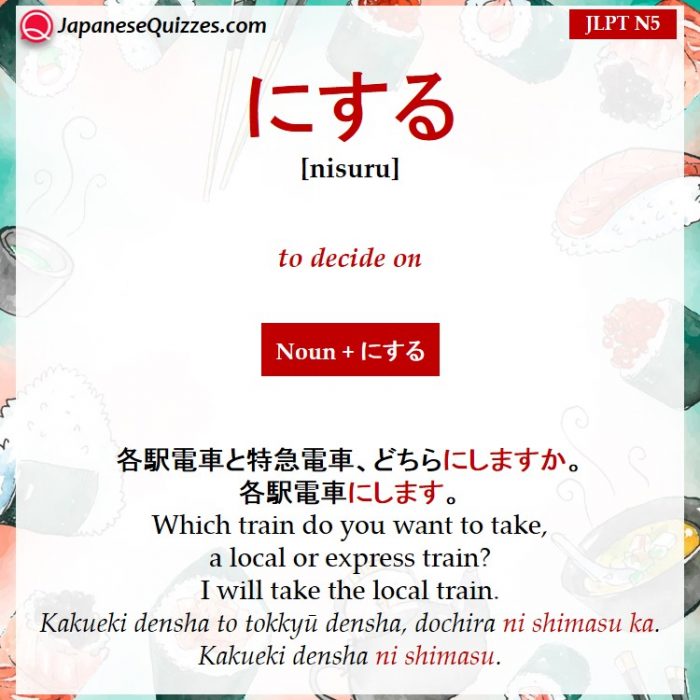

Formations
Noun + にする
Examples
今日は何にしますか?
私はラーメンにします。
Kyō wa nani ni shimasu ka?
Watashi wa rāmen ni shimasu.
どの色の車を買いますか?
私は銀色の車にします。
Dono-iro no kuruma o kaimasu ka?
Watashi wa gin’iro no kuruma ni shimasu.
各駅電車と特急電車、どちらにしますか。
各駅電車にします。
Kakueki densha to tokkyū densha, dochira ni shimasu ka.
Kakueki densha ni shimasu.
青い薬と赤い薬、どちらにしますか。
赤い薬にします。
Aoi kusuri to akai kusuri, dochira ni shimasu ka.
Akai kusuri ni shimasu.
紅茶とコーヒー、どちらにしますか。
コーヒーにします。
Kōcha to kōhī, dochira ni shimasu ka.
Kōhī ni shimasu.
食前、食後、いつコーヒーをお持ちしましょうか。
食後にします。
Shokuzen, shokugo, itsu kōhī o o-mochi shimashou ka.
Shokugo ni shimasu.
See also
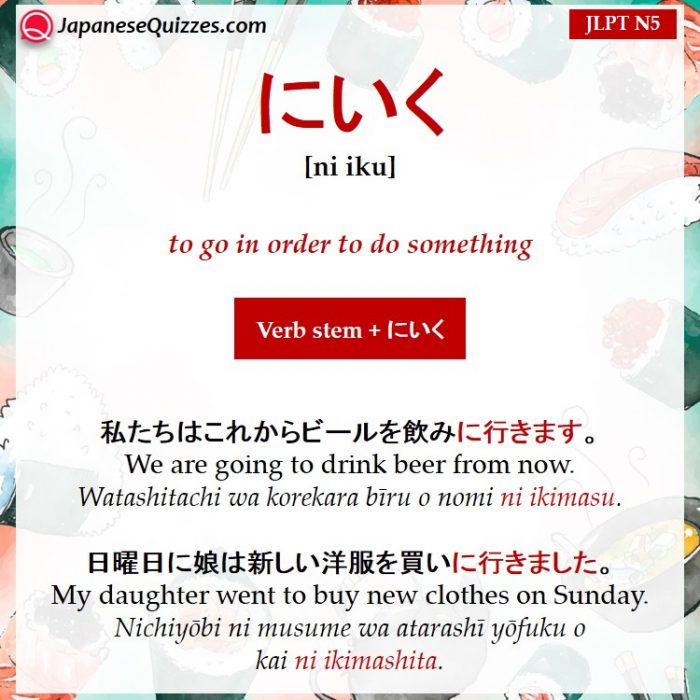
to go in order to do something

Formations
Verb stem + にいく
Examples
私たちはこれからビールを飲みに行きます。
Watashitachi wa korekara bīru o nomi ni ikimasu.
We are going to drink beer from now.
明日、私は家族と一緒に寿司を食べに行く。
Ashita, watashi wa kazoku to issho ni sushi o tabe ni iku.
I will go eat sushi with my family tomorrow.
明日、私は今年のJLPT試験を申し込みに行く。
Ashita, watashi wa kotoshi no JLPT shiken o mōshikomi ni iku.
I will go apply for the JLPT exam for this year tomorrow.
次の金曜日、姉は最新の映画を見に行く。
Tsugi no kin’yōbi, ane wa saishin no eiga o mi ni iku.
My older sister goes to the latest movie next Friday.
日曜日に娘は新しい洋服を買いに行きました。
Nichiyōbi ni musume wa atarashī yōfuku o kai ni ikimashita.
My daughter went to buy new clothes on Sunday.
部長はクライアントのオフィスに契約書を届けに行った。
Buchō wa kuraianto no ofisu ni keiyakusho o todoke ni itta.
The department manager went to deliver the contract to the client’s office.
See also
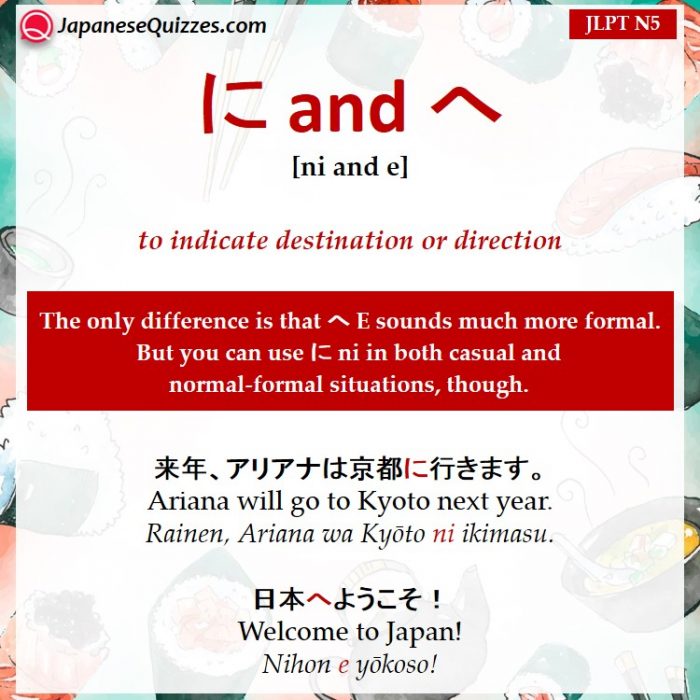
to indicate destination or direction.

Formations
The only difference is that へ E sounds much much more formal.
But you can use に ni in both casual and normal-formal situations, though.
Examples
彼女は会社に行く。
Kanojo wa kaisha ni iku.
She goes to her company.
弟は5時に家に帰る。
Otōto wa go-ji ni ienikaeru.
My brother comes home at 5 o’clock.
来年、アリアナは京都に行きます。
Rainen, Ari-ana wa Kyōto ni ikimasu.
Arianna will go to Kyoto next year.
日本へようこそ!
Nihon e yōkoso!
Welcome to Japan!
10分後、社長は会議室へ行く。
Jyuppun go, shachō wa kaigijitsu e iku.
The president will go to the meeting room after 10 minutes.
今、伊藤部長は大阪駅へ向かっている。
Ima, Itō buchō wa Ōsaka Eki e mukatte iru.
Ito director is heading to Osaka station.
See also
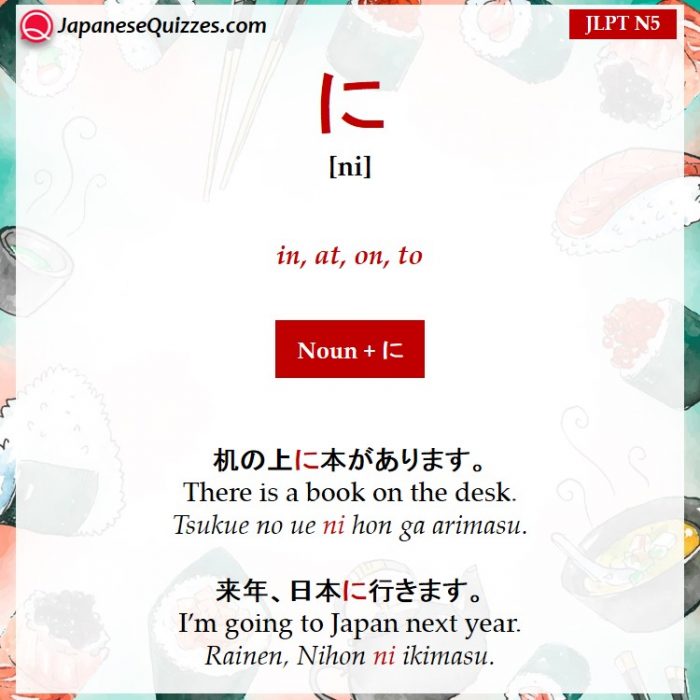

Formations
Noun + に
Examples
机の上に本があります。
Tsukue no ue ni hon ga arimasu.
There is a book on the desk.
私の猫は隣の部屋にいる。
Watashi no neko wa tonari no heya ni iru.
My cat is in the next room.
私の両親はニュー・ジャージー州に住んでいる。
Watashi no ryōshin wa nyū jājī-shū ni sunde iru.
My parents live in State of New Jersey.
これから、私たちは北に向かう。
Korekara, watashitachiha kita ni mukau.
We will head to the north from now.
明日、学校に行く。
Ashita, gakkō ni iku.
I will go to the school tomorrow.
来年、日本に行きます。
Rainen, Nihon ni ikimasu.
I’m going to Japan next year.
See also



















